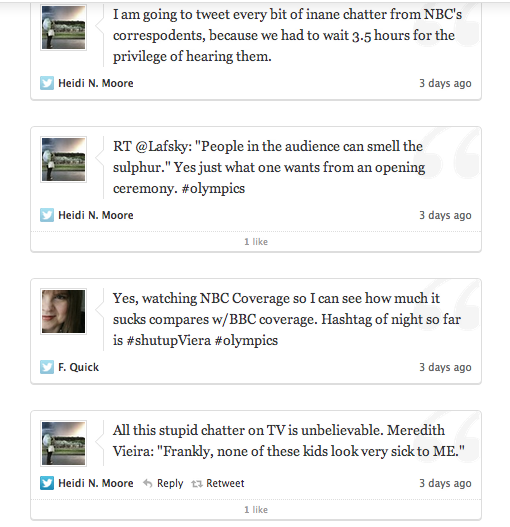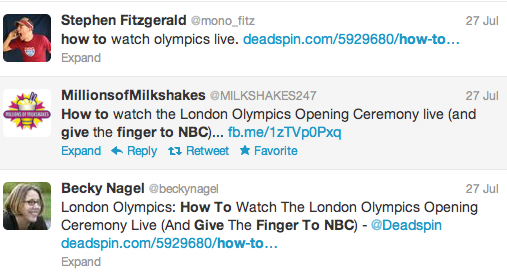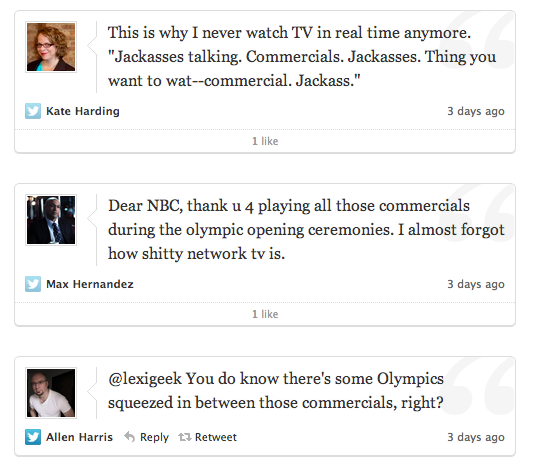I watched Bruce Jenner before he was a Kardashian. I cried when Nadia Comaneci scored a perfect ten. I ran the school track barefooted because Zola Budd rocked. Therefore, I eagerly anticipate the Olympics.
With this joie to vivre, I opened a jar of hummus and a Pabst Blue Ribbon (I’m patriotic too) at 4:00 on Friday. I anxiously scanned 2000 channels only to find that the opening ceremony was tape delayed.
Moreover, I was blocked from the BBC live coverage because of the agreement with NBC. After consulting with my tech friends, I downloaded Tunnel Bear and tried to watch it that way to no avail.
My frustration at being blocked from live coverage was compounded by the fact that Twitter and other social media were buzzing with images and comments from the ceremony—a ceremony that I could not watch for another three hours. I returned the hummus to the frig, but kept the PBR out to nurse the agony of defeat.
A New Hash Tag is Born
Once the broadcast started, my annoyance erupted to frustration. The commercials were overwhelming, the commentary made even my 13-year-old son say “They really don’t know much do they, Mom?” and many poignant parts of the ceremony were edited out in favor of commercials and interviews.
Two hours into it, I gave up but not before seeing that I was not alone. Twitter was no longer buzzing. It was flaming and the most popular hash tag was #NBCfail.
As a businessperson, I understand that NBC paid $2 Billion for the Olympic coverage and needed to recoup that investment. However, the way they treated me as a customer, made me dislike the brand, abandon the coverage and lose my enthusiasm for the games.
Some of the problems that NBC had with the Olympic coverage are not unlike things that retailers do to annoy their customers.
Real Time in a Social Media World
For the past year, the 2012 Olympics have been touted as the “first social media games.” As such, NBC should have figured there was an expectation for real time data. In a globally connected world, ‘now’ is the norm.
A delay of three hours feels like an eternity. In that amount of time, the meme is old and something else is trending. Because of this fast transmission of information, consumer patience is at an all-time low.
The competing demands of modern life make time a precious commodity. If you don’t value your customer’s time, then they will go elsewhere.
Don’t Dumb it Down
Because of easy access to information, Gen Y might not be able to name all the state capitals. Instead, they’ve become very adroit at looking things up. Moreover, they are worldly and politically astute
Jokes about the names of countries or saying how Sudan has that genocide thing sorted do not endear you to customers no matter the generation.
This is especially true because there were many interesting things that could have been discussed. For instance, the success of Tubular Bells actually launched Virgin Records. Why did the commentators feel the need to focus on the vapid rather than the relevant and interesting?
Today’s consumer is sophisticate and craves information that is factual and in context. If you try to be gimmicky you will alienate rather than endear your customers.
Over Restriction Causes Revolt
Because NBC blocked me from seeing content in other avenues, I went out of my way to circumvent them. Moreover, I’ve only watched one bit of coverage since then—the women’s gymnastics.
If Nadia Comaneci was competing in this year’s Olympics, I’d surely have missed it because the camera was trained only on Americans. Isn’t that the fun of the games? To see the diversity?
Because I felt so restricted as a consumer and viewer, I opted out. Instead, I get my coverage from other sources. If you are too restrictive in policies, then your customers will seek ways to avoid engaging with you.
Part of the bargain of network television is that you get free content and they get to market to you. Likewise, your customers know you need to make money in order to remain open to serve them. However, they expect things to be reciprocal and in balance.
Unfortunately, NBC quit respecting my time and interests by airing a commercial every five minutes and eliminating coverage—like the tribute to the London bombing victims in favor of Ryan Seacrest.
In addition, NBC did their advertisers a disservice. I was so bombarded that 1. I can’t remember any specific advertisement and 2. I was irritated with the abundance of commercials and that had a transitive effect on the brands presented.
When you lose sight of why your customer is there and instead focus on your own objectives, you risk alienating them. Customers understand you need to make a profit. However, you need to ensure that they never feel victimized as you do so.
Summary
NBC had an opportunity to create energized customers for themselves and the brands they represent. Instead, they spawned two popular hash tags #NBCfail and #NBCsucks. Some steps you can take to ensure that you don’t end up as the unpopular meme of the day are:
– Ensure that you respect your customers’ time and provide them with the data they need when they need it.
– Realize the clock has sped up and that means customers expect things ‘now’. Design your systems and processes with that in mind.
– Recognize that today’s customer is sophisticated and resourceful. Talk to them in a language that acknowledges this. Yes, they want information in bite-sized morsels, but they don’t want it to be without substance. The cardinal rule is to be authentic and useful.
– Consider whether or not your policies and procedures are highly restrictive and designed without mutual benefit in mind. If they are, you force your customers to go elsewhere.
– Remember customers understand you need to make a profit. However, they want to feel like they received value.
Think of social media as an opportunity get real time feed back. If you listen and adapt then you will continually improve the customer experience. Hopefully, NBC will rectify some of their challenges before Rio in 2016.







